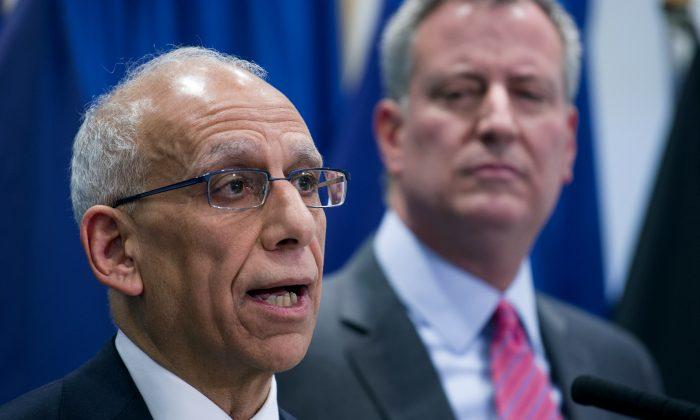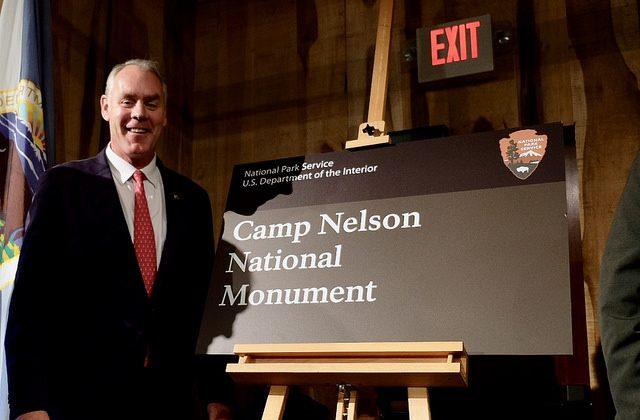NEW YORK—Mayor-elect Bill de Blasio appointed former Albany budget chief Dean Fuleihan as his budget director Wednesday. Fuleihan will take on the monumental task of leading New York City through unprecedented fiscal challenges that lie ahead, including funding new labor contracts including rising pension and health care costs.
“It is clear to me—that backdrop demands extraordinary talent and extraordinary capacity from the people we name to handle our budgetary challenges,” de Blasio said at New York City College of Technology Wednesday. “This is not business as usual. This is an assignment for someone who can handle the toughest situations there are.”
Fuleihan worked as the principal fiscal and policy adviser to the state Assembly for 33 years and was close to Speaker Sheldon Silver.
If de Blasio reaches an agreement with municipal labor unions, Fuleihan’s top priority will be to find funds to pay for wage increases and retroactive pay needed to satisfy the new contracts. Mayor Michael Bloomberg will hand de Blasio a balanced budget. But that budget allows for only a 1.25 percent pay increase and no retroactive pay.
Union leaders disagree with Bloomberg’s proposal. De Blasio has repeatedly stated he will head to the negotiating table with an open mind.
“All that we hope to do can only be achieved if we are fiscally responsible,” de Blasio said. “It is a pre-condition for all the progress we plan on making.”
After growing tired of negotiating with Mayor Bloomberg, labor leaders have been looking forward to negotiating with a new mayor. The fresh start may be a catalyst for a fiscally sound solution.
“The expired contracts present a large fiscal challenge, but given the fact there is a new mayor coming in a new sense of good will, there may also be an opportunity to construct a settlement that is both fiscally responsible and fair to public employees.” Maria Doulis, director of city studies at Citizens Budget Commission (CBC).
Rising Benefits Costs
De Blasio has been clear about the fiscal challenges that lie ahead for the city. He cites labor contracts and the uncertainty in federal funding as the biggest problem, however he rarely mentions the soaring pension and health care costs.
Pension costs increased by 372 percent to $8.18 billion during Bloomberg’s tenure, according to the comptroller’s office.
In his farewell speech Wednesday, Mayor Bloomberg pointed out how pension costs have taken away monies that could have gone to other services, such as affordable housing or new schools. He also urged drastic reform, not just in New York, but also for all cities.
“The costs of today’s benefits cannot be sustained for another generation—not without inflicting real harm on our citizens, on our children and our grandchildren,” Bloomberg said. “In the years ahead, I will stand with mayors and others who stand up for the next generation by tackling this issue.
Thanks to reform at the state level, pension costs are expected to level out over the next four years—but that is not the only budgetary landmine.
“The outlook on pension is stable. It is a lot of money, but it is no longer growing fast,” Doulis said. “Health insurance costs, however, are growing rather quickly.”
Municipal workers in New York City receive some of the most generous benefits in the country. Nearly 90 percent of city workers pay no premium for their health care. Retirees over 65 as well as their dependents are reimbursed for Medicare Part B. No other municipality in the country provides such a generous benefit.
Health insurance costs grew from $2.0 billion in 2002 to $4.8 billion in 2012, according to the Citizens Budget Commission. That figure is expected to rise to nearly $7 billion by 2016.
De Blasio’s policy book points to utilizing the Health and Hospitals Corporation to decrease costs, but the expected savings vary widely, from $750 million to $2 billion.
At Wednesday’s budget announcement de Blasio did not directly answer question about rising pension and health care costs, choosing instead to take a shot at Bloomberg’s pension reform suggestion.
“As much as I appreciate Mayor Bloomberg’s advice, I would caution that one should be careful about giving advice from that perspective,” de Blasio said referring to the fact Bloomberg did not negotiate new labor contracts.
As long as the market continues to flourish, pension costs should be taken care of by the pension fund. The city only pays in when the fund does not meet its return projections, which has happened five years during Bloomberg’s term.
Unlike pension costs, health care costs are unfunded, meaning the city must find the money year after year.
Without reform—something de Blasio can negotiate directly with the unions for—he will continue to have less money for the signature initiatives he promised the voters.
“When he has to propose a budget for the next fiscal year and he has to start to think about how he wants to fund some of his other priorities, it is going to become apparent very quickly [health] insurance costs are growing fast and will need to be reformed,” said Doulis.






Friends Read Free